Caryn
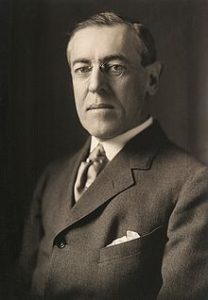 The United States has tried to stay out of most of the wars the rest of the world has become involved in, but sometimes circumstances have drawn us into wars we didn’t want to enter. World War I is a prime example of just such a situation. On February 26, 1917, President Woodrow Wilson learns of the so-called Zimmermann Telegram. The telegram was a message from German Foreign Secretary Arthur Zimmermann to the German ambassador to Mexico proposing a Mexican-German alliance in the event of a war between the United States and Germany. This telegram was a crucial step toward the entry of the United States into World War I.
The United States has tried to stay out of most of the wars the rest of the world has become involved in, but sometimes circumstances have drawn us into wars we didn’t want to enter. World War I is a prime example of just such a situation. On February 26, 1917, President Woodrow Wilson learns of the so-called Zimmermann Telegram. The telegram was a message from German Foreign Secretary Arthur Zimmermann to the German ambassador to Mexico proposing a Mexican-German alliance in the event of a war between the United States and Germany. This telegram was a crucial step toward the entry of the United States into World War I.
On February 24, 1917, British authorities gave Walter Hines Page, the United States ambassador to Britain, a copy of the Zimmermann Telegram. It was a coded message from Zimmermann to Count Johann von Bernstorff, the German ambassador to Mexico. 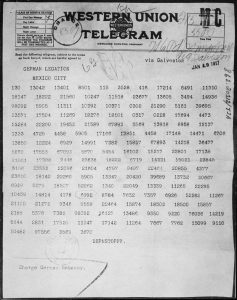 In the telegram, which was intercepted and deciphered by British intelligence in late January, Zimmermann instructed his ambassador, that in the event of a German war with the United States, to offer significant financial aid to Mexico, provided Mexico agreed to enter the conflict as a German ally. Germany also promised to restore to Mexico the lost territories of Texas, New Mexico and Arizona. Now, when you think about it, that is some big promises for Germany to be making, but I supposed that if the event of a loss in the war, all promises were null and void.
In the telegram, which was intercepted and deciphered by British intelligence in late January, Zimmermann instructed his ambassador, that in the event of a German war with the United States, to offer significant financial aid to Mexico, provided Mexico agreed to enter the conflict as a German ally. Germany also promised to restore to Mexico the lost territories of Texas, New Mexico and Arizona. Now, when you think about it, that is some big promises for Germany to be making, but I supposed that if the event of a loss in the war, all promises were null and void.
Upon learning about the proposed agreement between Germany and Mexico, the State Department was quick to send a copy of the Zimmermann Telegram to 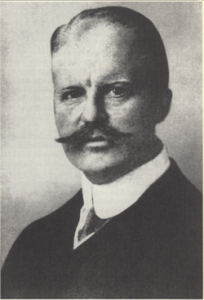 President Wilson. The president was shocked by the note’s content and the next day proposed to Congress that the United States should start arming its ships against possible German attacks. Wilson also authorized the State Department to publish the telegram. It appeared on the front pages of American newspapers on March 1, and it left many Americans horrified. The telegram was quickly declared a forgery by the public, but two days later, Zimmermann himself announced that it was genuine.
President Wilson. The president was shocked by the note’s content and the next day proposed to Congress that the United States should start arming its ships against possible German attacks. Wilson also authorized the State Department to publish the telegram. It appeared on the front pages of American newspapers on March 1, and it left many Americans horrified. The telegram was quickly declared a forgery by the public, but two days later, Zimmermann himself announced that it was genuine.
The Zimmermann Telegram helped turn the American public, already angered by repeated German attacks on United States ships, firmly against Germany. On April 2, President Wilson, who had initially sought a peaceful resolution to World War I, urged immediate United States entrance into the war. Four days later, Congress declared war against Germany, and the United States entered World War I on April 6, 1917.
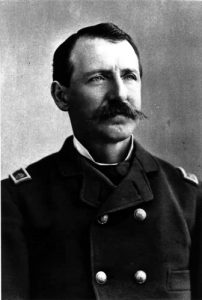 When people go missing these days, we are often not surprised. People seem to go missing all the time. Of course, most of them are murdered, or believed to be murdered. Very few are ever seen again, and as often as not, no one is ever prosecuted for their murder. This is not necessarily a new situation either. On February 1, 1896, one Albert Jennings Fountain and his eight year old son, Henry went missing near White Sands, New Mexico on their way home, after Fountain had attended a court term in Lincoln County. Mrs Fountain reported the two missing, and a search party was sent out the next day. On the Tularosa-Las Cruces road, about 45 miles from his home, the buckboard and team were found, along with Fountain’s papers, several empty cartridge casings, and two pools of blood. Missing were Fountain, his son, and Albert’s Winchester rifle.
When people go missing these days, we are often not surprised. People seem to go missing all the time. Of course, most of them are murdered, or believed to be murdered. Very few are ever seen again, and as often as not, no one is ever prosecuted for their murder. This is not necessarily a new situation either. On February 1, 1896, one Albert Jennings Fountain and his eight year old son, Henry went missing near White Sands, New Mexico on their way home, after Fountain had attended a court term in Lincoln County. Mrs Fountain reported the two missing, and a search party was sent out the next day. On the Tularosa-Las Cruces road, about 45 miles from his home, the buckboard and team were found, along with Fountain’s papers, several empty cartridge casings, and two pools of blood. Missing were Fountain, his son, and Albert’s Winchester rifle.
Albert Jennings Fountain was born in Staten Island, New York on October 23, 1838 to Solomon Jennings, a sea captain, and Catherine de la Fontaine Jennings, Albert grew up to go to Columbia College before traveling all over the world as a tutor. He then settled in California, where he worked at a newspaper before studying law in San Francisco. Though the reasons are unknown, Albert began to go by the name of “Albert Jennings Fountain,” an Anglicized version of his mother’s family name. In August, 1861 he enlisted in the Union Army and was commissioned as an officer in California Column. He participated in the Union conquest of the Confederate Territory of Arizona and fought at the Battle of Apache Pass.
During his time in the army, he married Mariana Perez in October, 1862 and the two would go on to have nine children. By the time he was discharged at the end of the Civil War, Albert had obtained the rank of captain. He and his family settled in El Paso, Texas, where he went to work for the United States Property Commission, which investigated and disposed of former Confederate property. Later he worked as a Customs Collector, was appointed an election judge, and the Assessor and Collector of Internal Revenue for the Western District of Texas. With this background, it is not surprising that he decided to try politics and in 1869, he won a seat in the Texas Senate. Fountain’s radical Republican views angered many Texas Democrats…my kind of guy. During the El Paso Salt War, Albert got into a shootout with a man named B. Frank Williams on December 7, 1870. Albert was wounded three times, but he killed Williams.
In 1875, the Fountain family moved to Mesilla, New Mexico, where his wife was from. It was here that Fountain began his law practice. Southern New Mexico, at that time, was still subject to frequent Indian raids and in 1878, Fountain became a captain in the first company of militia in southeast New Mexico, fighting in the campaigns against Chief Victorio and Geronimo. Continuing to serve in the militia, Fountain would reach the rank of colonel, a title that he was called for the rest of his life. In 1881, he was appointed to defend Billy the Kid in his charge for murder. In 1885, Fountain moved to Las Cruces to prosecute Federal land frauds. In 1888, he was elected to the New Mexico legislature, eventually becoming speaker of the house. Afterwards, he became a special prosecutor for livestock associations. In 1894 convicted 20 men for cattle rustling. His work as a politician and an attorney acquired numerous enemies for Albert, a fact that would prove to be fatal.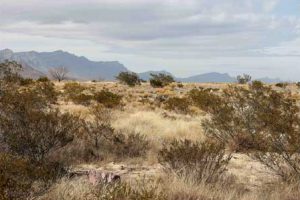
After an investigation into the disappearence, it was thought that a noted New Mexico gunman and rancher named Oliver M. Lee, along with two of his employees named Jim Gililland and William “Billy” McNew had perpetrated the crime. Eventually, all three were tried for the crime, but were acquitted for lack of evidence, namely the bodies, and the case remained open, with the Fountain bodies having never been found. Some historians also believe that the famed Sheriff Pat Garrett was assassinated while heavily investigating the Fountain murder, and that he might have been getting close to answering the age old question, “who done it”.

 My grand niece, Christina Masterson and my granddaughter, Shai Royce were like two peas in a pod as kids. Unfortunately, now that they live far apart, they don’t get to spend much time together. Nevertheless, they pretty much crammed a lifetime of mischief into those young years…like most kids. The things they used to do, while not really bad, were a part of the same shock factor actions of the kids today. I remember Shai being in my car, and suddenly yelling out the window at someone on the street, “Hi!!” After they looked at her, and me like we were crazy, she told me that she and Christina do that all the time. In my day, we didn’t want to look like the nut case in town, but apparently in their day, it was the cool thing to do. I guess I should be thankful that they were not the boys with their jeans around their knees. When I was a kid, it was the kids who didn’t want to be seen with the parents because they “might” do something embarrassing. So, now I guess it’s the in thing to be embarrassing, but I can promise you that, if I did that from their car, they would be quick to tell me in a shocked voice, “Grandma/Aunt Caryn, what are you doing?? Shhhhhh!!!” Apparently, I’ll never be back in the cool generation…sigh!!
My grand niece, Christina Masterson and my granddaughter, Shai Royce were like two peas in a pod as kids. Unfortunately, now that they live far apart, they don’t get to spend much time together. Nevertheless, they pretty much crammed a lifetime of mischief into those young years…like most kids. The things they used to do, while not really bad, were a part of the same shock factor actions of the kids today. I remember Shai being in my car, and suddenly yelling out the window at someone on the street, “Hi!!” After they looked at her, and me like we were crazy, she told me that she and Christina do that all the time. In my day, we didn’t want to look like the nut case in town, but apparently in their day, it was the cool thing to do. I guess I should be thankful that they were not the boys with their jeans around their knees. When I was a kid, it was the kids who didn’t want to be seen with the parents because they “might” do something embarrassing. So, now I guess it’s the in thing to be embarrassing, but I can promise you that, if I did that from their car, they would be quick to tell me in a shocked voice, “Grandma/Aunt Caryn, what are you doing?? Shhhhhh!!!” Apparently, I’ll never be back in the cool generation…sigh!!
Christina and Shai were born just 5 days apart, and they were among 6 of my parent’s grandchildren born over a three year period…all the rest of those grandkids were boys. I guess the girls would have to stick together. They would try to hide out away from the boys, but you know how little boys are. They did their very best to torment the girls. That of course resulted in much screaming from the girls. They could make it sound like mass murder, when it was simply that the boys were in the same room…or the same universe for that matter. And telling them to ignore them, you received a look like, “what does that even mean?” They just thought it was their right to ask for the removal of the offending boy, preferably to a different family. Of course, the main tormenter cousin was my grandson, Caalab Royce…Shai’s brother. That made matters far worse. Not only was he wanting to play, but Shai was around him all the time, so the screaming was more like howling!!! Caalab was always a true teaser, and the girls were his favorite target. I can’t tell you how many times Shai told me she wanted to have he adopted…by any other family in the world!! Thankfully, the three of them are the best of friends these days…who would have thought.
A number of years ago, Christina moved to Colorado to live with her mom, and finished growing up there. I have to admit that while the drama of those prior years drove me and their moms crazy, I missed it too. Christina graduated from high school, and went on to study dental hygiene. When she was done with school she got a place of her own, and in true Drama Queen Fashion, she has decorated her apartment with all the girlie, drama queen things. I don’t know about the rest of the apartment, but Christina has a pink living room, and I have to admit, drama queen or not, I think its really cute!! Today is Christina’s birthday. Happy birthday Christina!! Have a great day!! We love you!!
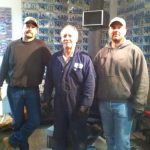
 Like most of the Schulenberg men, my brother-in-law Ron Schulenberg is a work-a-holic. When he isn’t working as a diesel mechanic at Wyoming Machinery, he is working on a car at his own house. This year Ron also put a roof on the family home and put up a fence around the yard. Like any work-a-holic, he spends an average of 16 working hours a day, and then comes in to spend time with his favorite people, his wife Rachel and his son Tucker, and the dogs of course. Weekends often find him working with his nephew, Barry or brother, Bob, both of whom are work-a-holics too. The men cut wood or work on cars. The main good news about all this for Rachel is the fact that she knows where to find him. That’s the way I always felt about Bob’s work.
Like most of the Schulenberg men, my brother-in-law Ron Schulenberg is a work-a-holic. When he isn’t working as a diesel mechanic at Wyoming Machinery, he is working on a car at his own house. This year Ron also put a roof on the family home and put up a fence around the yard. Like any work-a-holic, he spends an average of 16 working hours a day, and then comes in to spend time with his favorite people, his wife Rachel and his son Tucker, and the dogs of course. Weekends often find him working with his nephew, Barry or brother, Bob, both of whom are work-a-holics too. The men cut wood or work on cars. The main good news about all this for Rachel is the fact that she knows where to find him. That’s the way I always felt about Bob’s work.
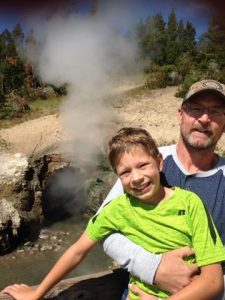
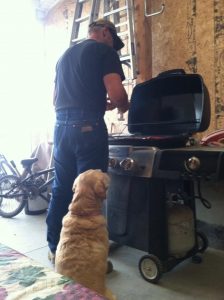
Ron loves grilling, and really knows his way around a barbeque grill. That seems to be another trait of the Schulenberg men…including my father-in-law, Walt Schulenberg, who was just like his sons and grandsons. Of course, these days, Ron has a helper with all his activities. His son Tucker, his sidekick, is right there doing whatever his dad is doing, be it working, playing, or grilling. They are best buddies, and they are perfectly happy to have each other to count on for help on their projects. It’s important to have an assistant for these things, and Tucker would rather be working with his dad, than almost anything else in the world.
While Ron is a work-a-holic, and like getting things done, he does like his relaxation time too. He enjoys 
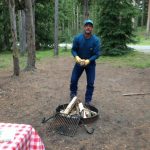 traveling. The family took a trip to New York a while back and really enjoyed Niagara Falls. Ron really enjoys his work, but the reality is that we work to make a better life for our family. Work is a means to an end…a better family life. I can’t picture Ron never getting out there and working…at least not until he is really, really old, but I think that if you ask Ron how he feels about the things he does in life, he would simply say, “I’d rather be camping!” Today is Ron’s birthday. Happy 50th birthday Ron!! Have a great day!! We love you!!
traveling. The family took a trip to New York a while back and really enjoyed Niagara Falls. Ron really enjoys his work, but the reality is that we work to make a better life for our family. Work is a means to an end…a better family life. I can’t picture Ron never getting out there and working…at least not until he is really, really old, but I think that if you ask Ron how he feels about the things he does in life, he would simply say, “I’d rather be camping!” Today is Ron’s birthday. Happy 50th birthday Ron!! Have a great day!! We love you!!
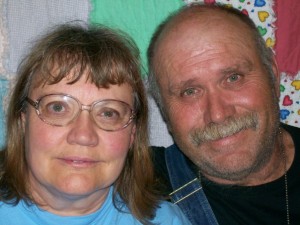
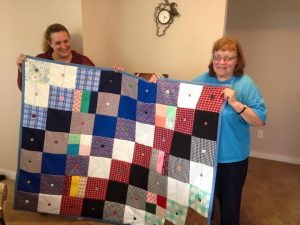 My sister-in-law, Debbie Cook leads a pretty busy life. During the school year, she is the “bus driver” for her two youngest grandchildren, Easton Moore and Kaytlyn Griffith after school. The older kids, Weston Moore and Jala Satterwhite have activities that go on after school, so Debbie has just the little ones. Debbie likes to do special things for the grandkids, such as the brownies she made as a treat for Valentine’s Day. Of course, when its nice outside, there is a lot more that can be done, like going to the park, where they can run and play, which is probably to their parents liking too, because then they are more settled at night…or is does that only work on the little ones?
My sister-in-law, Debbie Cook leads a pretty busy life. During the school year, she is the “bus driver” for her two youngest grandchildren, Easton Moore and Kaytlyn Griffith after school. The older kids, Weston Moore and Jala Satterwhite have activities that go on after school, so Debbie has just the little ones. Debbie likes to do special things for the grandkids, such as the brownies she made as a treat for Valentine’s Day. Of course, when its nice outside, there is a lot more that can be done, like going to the park, where they can run and play, which is probably to their parents liking too, because then they are more settled at night…or is does that only work on the little ones?
Winter is a dreaded time for lots of people, an most especially for anyone who like to got camping. Debbie and her husband, Lynn love to go camping, and I think that they would move to the mountains if it weren’t for the fact that the kids and grandkids live in town. So the next best thing is family camping trip to the Big Horn Mountains. Their daughter Machelle, told me that going camping with the family every weekend is so peaceful and quiet and that they al really enjoy it. Machelle says it is like having a sleepover every weekend. Now when you think about it, which of us wouldn’t love to go home sometimes to relive the days of our youth…especially the ones when you and your siblings had a sleepover on the living room floor. That’s kind of how it feels to the family when they are all camping together in the beauty of the mountains.
Her family is the most important thing to Debbie. She loves being around the grandchildren, and especially having them all want to go camping together. It’s like taking weekly vacations together all your life. Most 
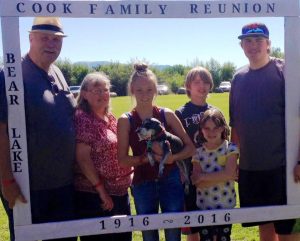 people quit taking together vacations when they get married, so it’s something special. I suppose that with the next generation coming of age, things are likely to change. When the grandkids are driving and working, they can’t always go along on the fun stuff, and they are old enough to stay alone, so things slowly change. Hopefully it doesn’t change too fast. Today is Debbie’s birthday. Happy birthday Debbie!! Have a great day!! We love you!!
people quit taking together vacations when they get married, so it’s something special. I suppose that with the next generation coming of age, things are likely to change. When the grandkids are driving and working, they can’t always go along on the fun stuff, and they are old enough to stay alone, so things slowly change. Hopefully it doesn’t change too fast. Today is Debbie’s birthday. Happy birthday Debbie!! Have a great day!! We love you!!

 As the three year mark since my mom, Collene Spencer went to Heaven arrives, I realize more and more how many time I have wanted to go to her and ask a question, get her advise, or just hear what she thought of my most recent story. Mom was, after all, my biggest fan. It didn’t matter what I wrote about, she liked it. And so often, she was part of it. She answered my many questions about the family, told me the inspirational things that happened, or the funny things her siblings would dream up. Hearing her talk about it all made me feel like I was there watching her and her siblings growing up. I could feel the coziness of my grandparents house, and hear the laughter of the kids in the kitchen as they did the dishes or helped with cooking the evening meal. Mom created that exclusive viewing for me, and I have felt very privileged to have been able to take that little tour into her history with her. Now that she is in Heaven, I find myself with more questions to ask her, and I really wish that Heaven had a telephone, so I could hear her voice and ask her the things that I want to know, because in Heaven, our minds have perfect recall, so the stories would be even more rich with detail.
As the three year mark since my mom, Collene Spencer went to Heaven arrives, I realize more and more how many time I have wanted to go to her and ask a question, get her advise, or just hear what she thought of my most recent story. Mom was, after all, my biggest fan. It didn’t matter what I wrote about, she liked it. And so often, she was part of it. She answered my many questions about the family, told me the inspirational things that happened, or the funny things her siblings would dream up. Hearing her talk about it all made me feel like I was there watching her and her siblings growing up. I could feel the coziness of my grandparents house, and hear the laughter of the kids in the kitchen as they did the dishes or helped with cooking the evening meal. Mom created that exclusive viewing for me, and I have felt very privileged to have been able to take that little tour into her history with her. Now that she is in Heaven, I find myself with more questions to ask her, and I really wish that Heaven had a telephone, so I could hear her voice and ask her the things that I want to know, because in Heaven, our minds have perfect recall, so the stories would be even more rich with detail.
Of course, the telephone call would not be just to ask her the many questions I still have, but also to hear her voice again, and my dad’s voice too. It has been so very long since I have heard their sweet voices, and I think they are among the things I miss the most. Of course, their faces, and really their person, but their voices are the essence of who they were. Thankfully, God has given me a clear memory, and in my memory files, their voices are stored. I can hear Mom’s laugh, along with her way of being just a little bit goofy, and Dad’s teasing, which had a way of driving Mom crazy…and of course, their life lessons…which is probably a nice way of talking about the many times they had to discipline me. Sometimes, I think I might have been their biggest challenge, and I believe my sisters would agree. They have often wondered how I made it to adulthood. All those things went into the life our parents created for us, and I wish every day that we could have them back. I wouldn’t want to go back in time exactly, but rather I wish that they could have continued on into what for them would have been the future. I would love for them to meet the new little family additions they have now. We have added lots of babies, and there are more of them on the way. They have four great great grandchildren now, and one more on the way. They loved those babies, and I wish they could have seen these great great grandbabies. Their legacy continues. If Heaven had a telephone, we could call and let them talk to these 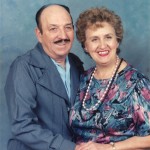
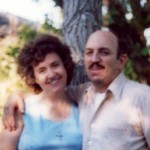 precious great grandbabies and great great grandbabies. Oh, how I wish we could call them. There is so much I would like to tell them. If only Heaven had a telephone. While I miss you so much on this day, in particular, Mom, I know that you and Dad are having the most amazing time in Heaven, and you can’t wait for all of us to get there…where we will realize why Heaven doesn’t have a telephone. When we are all there, we will never need telephones again. What an awesome day that will be. We love and miss you Mom…and Dad too. See you both someday soon…and we can hardly wait.
precious great grandbabies and great great grandbabies. Oh, how I wish we could call them. There is so much I would like to tell them. If only Heaven had a telephone. While I miss you so much on this day, in particular, Mom, I know that you and Dad are having the most amazing time in Heaven, and you can’t wait for all of us to get there…where we will realize why Heaven doesn’t have a telephone. When we are all there, we will never need telephones again. What an awesome day that will be. We love and miss you Mom…and Dad too. See you both someday soon…and we can hardly wait.
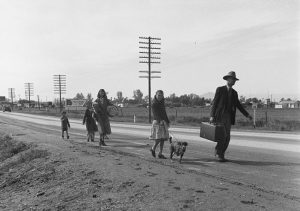
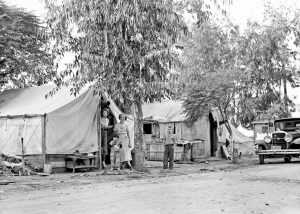 The “Dust Bowl” was an environmental disaster that hit the Midwest in the 1930s. A combination of a severe water shortage and harsh farming techniques caused the disaster. Some scientists believe it was the worst drought in North America in 300 years. The lack of rain killed the crops that kept the soil in place. When winds blew, they raised enormous clouds of dust. It deposited mounds of dirt on everything, even covering houses. With the Dust Bow came the failure of many farms in the Midwest, and the people had no choice but to move, in order to find a way to make a living.
The “Dust Bowl” was an environmental disaster that hit the Midwest in the 1930s. A combination of a severe water shortage and harsh farming techniques caused the disaster. Some scientists believe it was the worst drought in North America in 300 years. The lack of rain killed the crops that kept the soil in place. When winds blew, they raised enormous clouds of dust. It deposited mounds of dirt on everything, even covering houses. With the Dust Bow came the failure of many farms in the Midwest, and the people had no choice but to move, in order to find a way to make a living.
I suppose that the invasion that followed might have been similar to the current refugees. It wasn’t just one family that moved, but hundreds of families. Los Angeles Police Chief James E. Davis, seeking to halt the “invasion” of dust-bowl Depression refugees in February, 1936, declared a “Bum Blockade” to stop the mass emigration of poverty stricken families fleeing from the dust-torn states of the Midwest. These days, he would have met with severe criticism, not so much for the blockade, as for the name of the blockade.
By 1934, 75% of the United States was severely affected by this terrible drought. The region most affected was the Great Plains, and included more than 100 million acres, centered in Oklahoma, the Texas Panhandle, Kansas, and parts of Colorado and New Mexico. These millions of acres of farmland became useless and soon, hundreds of thousands of people were forced to leave their homes. Many of these destitute families packed up their belongings and migrated west, hoping to find work and a better life, about 200,000 of which were California bound. Instead of finding the promised land of their dreams, however, they found that the available labor pool was vastly disproportionate to the number of job openings that could be filled. Migrants who found employment soon learned that this surplus of workers caused a significant reduction in the going wage rate, and even when the entire family worked, they were unable to support themselves.
Many set up “ditchbank” camps along irrigation canals in the farmers’ fields, which brought with them poor sanitary conditions and created a public health problem. And, of those who could find work in agriculture, it did not put an end to their travels. Instead, their lives were characterized by transience, if they wanted to maintain a steady income, which required them to follow the various harvests around the state. In the meantime, California was overwhelmed, trying to figure out how to absorb as many as 6,000 migrants crossing its borders daily. Also feeling the effects of the Depression, California infrastructures were already overburdened, and the steady stream of newly arriving migrants was more than the system could bear. Though these refugees came from a number of states, Californians often lumped them together as “Okies” or “Arkies,” who became the butt of derogatory jokes and the focus of political campaigns in which candidates made them the scapegoat for a shattered economy. They were accused of many crimes, as well as shiftlessness, lack of ambition, school overcrowding and stealing jobs from native Californians.
California’s Indigent Act was passed in 1933, which made it a crime to bring indigent persons into the state, Davis contended that his men needed no special approval because “any officer has the authority to enforce the state law.” Asking border-county sheriffs to deputize his officers, most complied. However, some refused, including Modoc County, who forced 14 LAPD officers to leave after they turned away local residents trying to 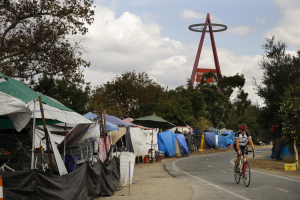
 return home. On August 24, 1935, the Los Angeles Herald-Express ran an article warning emigrants to stay away from California. It read: Stay Away From California: Warning To Transient Hordes. Those days were very different from the California of today, and not in a good way. I don’t agree with derogatory name calling, but common sense tells us that sometimes you have to try to stop a flood, even if it’s a flood of people.
return home. On August 24, 1935, the Los Angeles Herald-Express ran an article warning emigrants to stay away from California. It read: Stay Away From California: Warning To Transient Hordes. Those days were very different from the California of today, and not in a good way. I don’t agree with derogatory name calling, but common sense tells us that sometimes you have to try to stop a flood, even if it’s a flood of people.
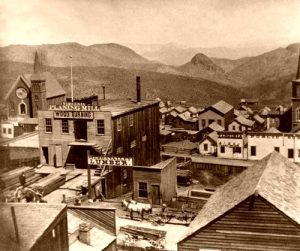 Gold brought miners from the east to multiple areas of the American west…all looking to make their fortune in the gold fields. Unfortunately, it wasn’t just gold and silver miners who flooded Nevada, or any other gold rush area, in the late 1800s in search of their fortunes. The West was indeed wild, and it and the gold also attracted plenty of outlaws and bandits, looking to make their fortune too, but not willing to do the work to mine the gold. Nevada, like other states of the Wild West, attracted its share of outlaws and bandits. One such man, named Andrew Jackson “Jack” Davis, led a gang of thieves involved in robbing stage stops, bullion wagons, and trains in Western Nevada.
Gold brought miners from the east to multiple areas of the American west…all looking to make their fortune in the gold fields. Unfortunately, it wasn’t just gold and silver miners who flooded Nevada, or any other gold rush area, in the late 1800s in search of their fortunes. The West was indeed wild, and it and the gold also attracted plenty of outlaws and bandits, looking to make their fortune too, but not willing to do the work to mine the gold. Nevada, like other states of the Wild West, attracted its share of outlaws and bandits. One such man, named Andrew Jackson “Jack” Davis, led a gang of thieves involved in robbing stage stops, bullion wagons, and trains in Western Nevada.
Davis first arrived in the area in 1859. His plan was to lead two different lives, 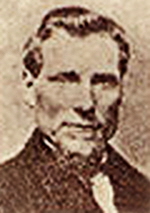 and he carried it out quite well. To the outside world he looked like a legitimate business man when he set up a livery stable in Gold Hill. However, in his “spare” time, Davis and his gang took to the bandit road, taking gold and bullion from any source they could find. Davis built a small bullion mill in Six Mile Canyon east of Virginia City, Nevada. There, he melted down his stolen gold, selling it as legitimate gold bars. He then buried his proceeds so people would not notice or catch on to how wealthy he really was, because after all, how rich could a livery stable owner be.
and he carried it out quite well. To the outside world he looked like a legitimate business man when he set up a livery stable in Gold Hill. However, in his “spare” time, Davis and his gang took to the bandit road, taking gold and bullion from any source they could find. Davis built a small bullion mill in Six Mile Canyon east of Virginia City, Nevada. There, he melted down his stolen gold, selling it as legitimate gold bars. He then buried his proceeds so people would not notice or catch on to how wealthy he really was, because after all, how rich could a livery stable owner be.
On November 4, 1870 the gang robbed the express car of the Central Pacific Railroad near Verdi, Nevada taking some $40,000 in gold coins and bullion. Pursued by lawmen, they were said to have buried the stolen cache along the north bank of the Truckee River, between Reno and Laughton’s Hot Springs west of town, near the site of the long-abandoned River Inn. The entire gang was apprehended and all were sent to the Nevada State Prison, but would not tell where they had hidden their stolen loot. In 1875, Davis was paroled but two 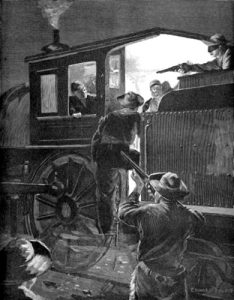 years later, he was shot in the back during a Wells Fargo stagecoach robbery near Warm Springs, Nevada. If Davis ever returned for his cache is unknown, but many believe it is still hidden in Six-Mile Canyon or in the vicinity of the Truckee River. Treasure hunters have long searched these two locations without success. If the money is still there, it may never be found.
years later, he was shot in the back during a Wells Fargo stagecoach robbery near Warm Springs, Nevada. If Davis ever returned for his cache is unknown, but many believe it is still hidden in Six-Mile Canyon or in the vicinity of the Truckee River. Treasure hunters have long searched these two locations without success. If the money is still there, it may never be found.
Another legend abounds that the ghost of Jack Davis protects his treasure in the canyon. Many who have looked for the treasure have been frightened away by the white screaming phantom that is said to sometimes sprout wings and rise into the air. I suppose some would say I shouldn’t be so skeptical, but since I don’t believe in ghosts, my guess is that people just get freaked out, and their imagination runs away with them. Nevertheless, those who think they have seen what they believe to be a ghost, would not be persuaded by my disbelief in same.
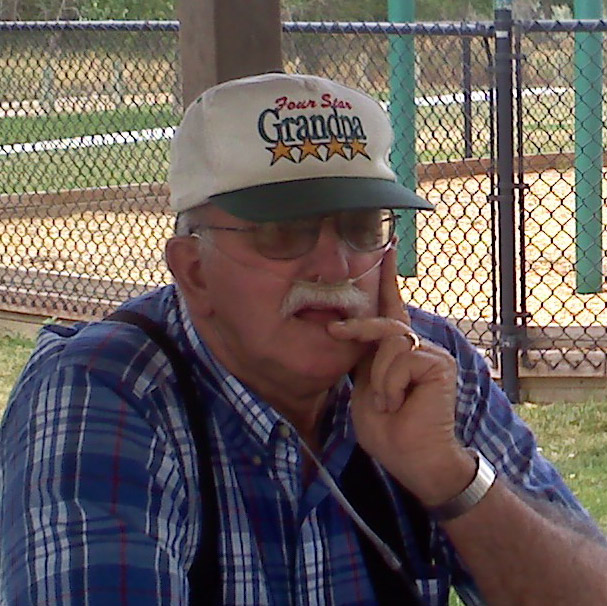 My uncle, Jack McDaniels was such a sweet man. He cared about everyone he knew. He was a friend to all, and all of the kids in the family loved him. He was first and foremost, a family man, and took care of anyone who needed it. For many years, his mother lived just a few steps away in a little trailer house, basically in the front yard of the family home. It kept her close to the family, and he could take care of her.
My uncle, Jack McDaniels was such a sweet man. He cared about everyone he knew. He was a friend to all, and all of the kids in the family loved him. He was first and foremost, a family man, and took care of anyone who needed it. For many years, his mother lived just a few steps away in a little trailer house, basically in the front yard of the family home. It kept her close to the family, and he could take care of her.
Like a lot of men, Uncle Jack loved tinkering with cars. In his younger days, he drive a stick car, and once that is in your blood, it follows that car races are something that never really gets out of your system. Uncle Jack was no different. I’m sure there were many days when the television at the family home was locked into one car race or another. I don’t know how my Aunt Bonnie, his wife, felt about car races, but it could have very easily been a matter of like it or go find something else to do. I rather think that she ended up liking it, because they loved spending time together. You rarely saw one without the other, 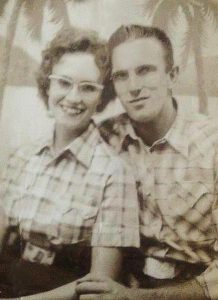 at least on his days off.
at least on his days off.
Uncle Jack was a walking Casper Historian, which is something I wish I had known years ago. The stories he could have shared with me would have enriched my blog greatly, I’m sure. He wasn’t a pushy person though, and so unless you asked, he probably didn’t feel like he could intrude. If only I had known to ask.
Along with history and car racing, Uncle Jack loved hunting, fishing, and camping, making him a true Wyoming outdoorsman…not surprising since he was born and raised right here in Casper, Wyoming. He grew up with all the great things there are to do here, and he wanted to show his family all the wonderful things he had been able to do as a kid. He wanted them to have the same kind of amazing life he did. Today would have been Uncle Jack’s 80th birthday. Happy birthday in Heaven Uncle Jack. You were a great man. We love and miss you very much.
 My grand nephew, Easton Moore is a busy guy. He is always on the go. Right now, he and his family are into Nerf Guns. They love to have Nerf battles, and the family very likely used sneak attacks to gain a little leverage. Basically, you just never knew when the attack was going to come, until the Nerf bullet hit you. Easton really likes the Nerf gun, and he is very interested in how they work, so he likes to take them apart and modify them so they will shoot further. It’s not surprising that he like to find out how his Nerf gun works, because it is something his Dad, Steve Moore loves to do too. Building, dismantling, and learning all about the guns they use, real and Nerf, is a hobby the Moore family has been into for quite a while now, and since Easton has grown up in that atmosphere, he is completely comfortable with the inner workings of a gun. So, for a new challenge, his mom bought a bag of rubber bands, and over the last few weeks there has been a new war going on in the Moore house. Easton is getting good at shooting them, but his arm was all red from learning how to shoot them. Still, he never gave up.
My grand nephew, Easton Moore is a busy guy. He is always on the go. Right now, he and his family are into Nerf Guns. They love to have Nerf battles, and the family very likely used sneak attacks to gain a little leverage. Basically, you just never knew when the attack was going to come, until the Nerf bullet hit you. Easton really likes the Nerf gun, and he is very interested in how they work, so he likes to take them apart and modify them so they will shoot further. It’s not surprising that he like to find out how his Nerf gun works, because it is something his Dad, Steve Moore loves to do too. Building, dismantling, and learning all about the guns they use, real and Nerf, is a hobby the Moore family has been into for quite a while now, and since Easton has grown up in that atmosphere, he is completely comfortable with the inner workings of a gun. So, for a new challenge, his mom bought a bag of rubber bands, and over the last few weeks there has been a new war going on in the Moore house. Easton is getting good at shooting them, but his arm was all red from learning how to shoot them. Still, he never gave up.
Easton really likes building things too. Legos has been a starting point for him, and something he continues to like to do. The schools these days have embrace the Lego craze, and added robotics, giving the kids new activities to stir up the creative side of their brains. They learn how to make their robot be the best functioning one in the competition. Who would have thought that a toy we have all played with could morph into a way to teach the kids about architecture and mechanics? Nevertheless, Legos have done this, and it is really a cool thing for a kid like Easton, who really loves to find out just how these things work.
 Easton loves sports. He played football again this year and is thinking about tennis in the spring. He is an active kid, who doesn’t much like sitting still, so sports was the next logical idea for him, but he has a few other activities up his sleeve too. He has helped his grandparents with their rentals and had made a little cash. He worked with PESCO which is the concessions stand for games and after school and made money doing that. Easton has decided that he doesn’t have that much time to save money for the car he will need in a couple of years when he turns 16, now if his mom could just slow down time a little bit, she would feel better, because, she doesn’t want him growing up. Today is Easton’s 14th birthday. Happy birthday Easton!! Have a great day!! We love you!!
Easton loves sports. He played football again this year and is thinking about tennis in the spring. He is an active kid, who doesn’t much like sitting still, so sports was the next logical idea for him, but he has a few other activities up his sleeve too. He has helped his grandparents with their rentals and had made a little cash. He worked with PESCO which is the concessions stand for games and after school and made money doing that. Easton has decided that he doesn’t have that much time to save money for the car he will need in a couple of years when he turns 16, now if his mom could just slow down time a little bit, she would feel better, because, she doesn’t want him growing up. Today is Easton’s 14th birthday. Happy birthday Easton!! Have a great day!! We love you!!

